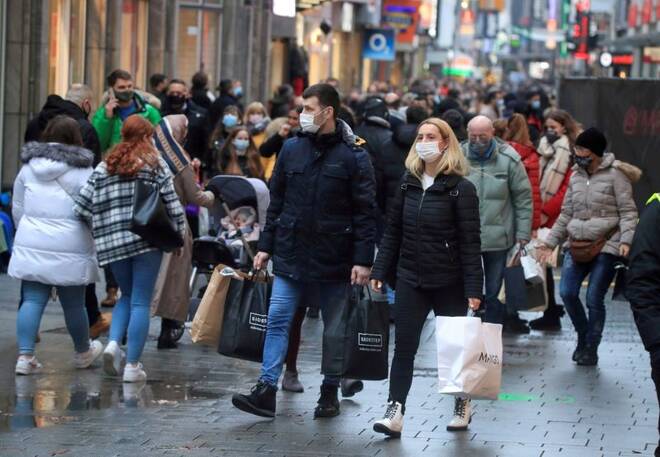Advertisement
Advertisement
German COVID-19 rules put off shoppers, says retailer group
By:
BERLIN (Reuters) - The tighter restrictions Germany has introduced to try to limit the spread of COVID-19 are putting people off from shopping in the usually busy run-up to Christmas, the country's association of retailers (HDE) said on Sunday.
BERLIN (Reuters) – The tighter restrictions Germany has introduced to try to limit the spread of COVID-19 are putting people off from shopping in the usually busy run-up to Christmas, the country’s association of retailers (HDE) said on Sunday.
The HDE said sales in bricks-and-mortar non-food retail were down an average of 26% in the last week compared to the pre-crisis year of 2019, according to a survey of some 1,600 firms.
Clothing retailers were particularly hard hit, with sales down 35% on the pre-crisis level.
Visitor numbers in city centre shopping districts are down 41% compared to 2019. This time last year, restaurants and bars were closed in a partial lockdown and there were limits on the number of people allowed to meet, although stores were open.
German officials agreed on Thursday to bar unvaccinated people from accessing all but the most essential businesses such as grocery stores, pharmacies and bakeries, and also decided to seek to make vaccination mandatory.
“The introduction of stricter coronavirus measures in shops is a dramatic disruption to the Christmas business,” HDE Chief Executive Stefan Genth said in a statement.
The HDE is therefore calling on the government to provide more financial support to retailers.
Germany recorded 42,055 new infections on Sunday and another 94 deaths, bringing the total death toll to 103,040.
“Retailers had placed their hopes on the Christmas business,” Genth said. “But now many retailers are once again moving closer to the precipice with each passing day: a disastrous outlook.”
According to HDE estimates, sales losses in the affected non-food retail sector may amount to 5.5 billion euros ($6.22 billion) in December. According to the survey, 77% of firms have negative expectations for the weeks ahead.
($1 = 0.8839 euros)
(Reporting by Emma Thomasson; editing by David Evans)
About the Author
Reuterscontributor
Reuters, the news and media division of Thomson Reuters, is the world’s largest international multimedia news provider reaching more than one billion people every day. Reuters provides trusted business, financial, national, and international news to professionals via Thomson Reuters desktops, the world's media organizations, and directly to consumers at Reuters.com and via Reuters TV. Learn more about Thomson Reuters products:
Did you find this article useful?
Latest news and analysis
Advertisement
